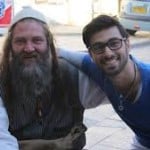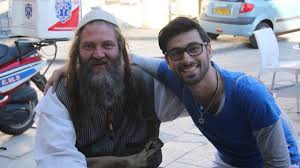Oseh Shalom Bimromav

Moshe Kempinski
A short time before Yoav Hattab, (H’yd) was killed in the Kosher market in Paris, he was visiting here in the old city of Jerusalem with his friends as part of the “Taglit” program. From the pictures and videos his friends have put up, it is clear that he was passionate about this land , his people and his G-d. Several days later he was shot dead by an Islamic terrorist while buying festive food for the Shabbat
How can this be truly understood, if at all?
Perhaps insights from the Torah portion can be helpful .At the end of the torah portion of Shmot we encounter the following. Moshe and Aaron are verbally attacked by a very pained and troubled Israelite people whose terrible work load was going to be increased because they dared to ask to leave ;
“And they said to them, “May the Lord look upon you and judge, for you have brought us into foul odor in the eyes of Pharaoh and in the eyes of his servants, to place a sword into their hands to kill us.” ( Exodus 5:21-23)
Moshe feeling the pain of his people cries out, “O Hashem! Why have You harmed this people? Why have You sent me? Since I have come to Pharaoh to speak in Your name, he has harmed this people, and You have not saved Your people.” ( ibid:23)
Hashem responds to Moshe in this week’s Torah portion;
“G_d spoke to Moshe, and He said to him, : “I am HaShem( the L-rd). I appeared to Avraham, to Yitzchak and to Yaacov, as E-l Sha-dai, but by my name HaShem I did not make myself known to them.” (Exodus 6:2-3 )
This statement clearly needs to be understood, since we see that in fact that G-d did appear with the Divine name of Hashem to all our forefathers. To Avraham He appears, as He said to him, “I am HaShem who brought you out of Ur Kasdeem.” (Genesis 15:7) To Yitzchak, we see as well: “He went up from there to Be’er Sheva. HaShem appeared to him that night.” (Genesis 26:23-24) To Jacob as well, as we read: “And behold, HaShem was standing over him and He said, ‘I am HaShem, G-d of Avraham your father and G-d of Isaac.’” (Genesis 28:13)
With the words “but my name HaShem I did not make revealed to them”, Hashem was actually saying something very dramatic and instructive. He is explaining that He did not need to reveal the attributes of the Ineffable name with or for the forefathers.
The name of HaShem (translated as “the L-rd”), as Rashi points out, is the essential name of G-d, working outside of the limitations of nature, in order to fulfill his promises and actualize them. Ramban (Rabbi Moshe Ben-Nachman) teaches that the name Sha-dai on the other hand, represents G-d working within the rules and laws of nature.
In all of G-d’s dealings with the Patriarchs, He is discovered, revealed and revered within the parameters of the natural world. The forefathers discovered the intimacy and the spiritual power of HaShem within natural reality. They did not need for Him to be revealed to them in some dramatic or supernatural way .they did not need to try to understand His ways.
In essence G-d was saying do not expect to determine how the plan of redemption will unfold. Trust that in the workings of this Divine plan there will be much that will not be understood in the natural “here and now”. But know that “there is a plan” and every individual making a decision to be part of this plan will be used to push that destiny forward.
When Yoav Hattab (H’yd) was in the Jewish quarter he and three friend visited one of the Judaica shops on Chabad street. When they entered the shop they heard a song being played on the loudspeakers in the shop. The four of them started to sing aloud with the song. The shop owner, Yaacov , pushed up the volume and soon they and others passing by were singing and clapping together wildly to the words of the song. It was a song of faith, and determination. The same faith and determination that empowered Yoav (H’yd) when he returned to his fateful encounter with the evil confronting his people, and according to some reports tried to subdue the Islamic murderer. He died trying.
The words of the song the four young men were singing were powerful on the one hand and hopeful as well;
Oseh Shalom Bimromav
May He who makes peace in high places,
make peace for us
and for all Israel,
and let us say, amen
Hashem is moving his plan forward and each individual that joins the journey will be used to push it forward.Some will sacrifice themselves in a flash of Kiddush hashem and some will serve and build this land.All those actions will bring about the eternal shalom that Yoav (H’yd) and his friends yearned for.
May the memories of Philippe Braham( h’yd), Yohan Cohen( h’yd), Yoav Hattab( h’yd), Francois-Michel Saada( h’yd), be for a blessing.
LeRefuat Yehudit bat Golda Yocheved

May their memory be a blessing.
And above all remember that it is HaShem who is in control – He keeps His children in His hands; not ours’ But may their memories be a blessing to others.